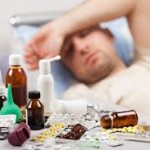In cystic acne the sebaceous gland ducts are plugged below the level of the skin, often much deeper than whiteheads or papules. Because the infection is deeper, if a sufferer picks or tries to pop a cyst they often drive the infection even deeper and it takes even longer for the cyst to heal. Sometimes trying to pop a pimple in the near vicinity of a cyst will have the same effect of driving the infection deeper.

Popping pimples is a bad habit to develop because this usually makes the skin condition worse. If a pimple is popped before it has matured you run the risk of developing a cyst, nodule or papule, which takes longer to heal. You will also increase the risk of scarring.
These nodules are similar to acne but they are actually filled with pus and are generally at least 5 millimeters in diameter. They are unsightly, painful, slow healing and lead to scarring. All are factors that make a visit to the dermatologist a significant part of a treatment plan.
A dermatologist will be able to recommend the best treatment plan for cystic acne that is not available over the counter. Often times treatment can include direct injection of medication into the cyst that can help it resolve over the next several days. Over the counter medications are not as effective treatments as they are for other forms of acne.
Resources:
Wake Forest University Baptist Medical Center: Link Found Between Teens’ Stress Levels and Acne Severity
http://www.sciencedaily.com/releases/2007/03/070305141029.htm
US National Library of Medicine: Acne
http://www.ncbi.nlm.nih.gov/pubmedhealth/PMH0001876/
University of Michigan Health Services: Acne
Canadian Family Physicians: Psychological Sequelae of Acne Vulgaris
http://www.ncbi.nlm.nih.gov/pubmed/17273501
| Advertisement | |
 |
|


Leave a Reply